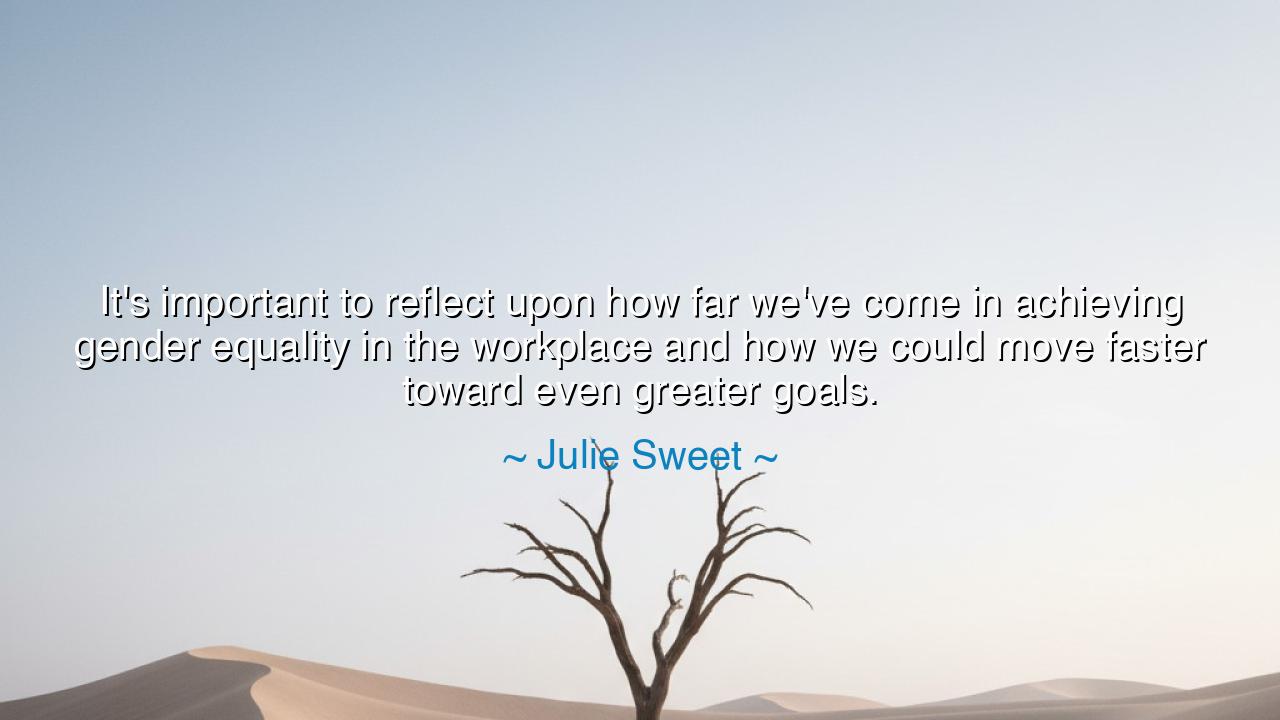
It's important to reflect upon how far we've come in achieving
It's important to reflect upon how far we've come in achieving gender equality in the workplace and how we could move faster toward even greater goals.






“It's important to reflect upon how far we've come in achieving gender equality in the workplace and how we could move faster toward even greater goals.” — Julie Sweet
In these words, Julie Sweet calls upon the spirit of reflection and ambition — two forces that shape the destiny of every civilization. Her message is not one of mere praise for progress, but of vigilance: that the path toward gender equality in the workplace is long, and though the distance behind us is great, the journey ahead demands greater courage still. She reminds us that history moves not only through the triumphs we celebrate, but through the momentum we refuse to lose. To pause and honor progress is noble; to press forward despite it is divine.
From the earliest dawn of organized labor, the workplace was a temple guarded by one half of humanity, while the other half waited outside its gates. For centuries, women were told that intellect, authority, and leadership were not their realm. Yet time and truth are patient warriors. When women began to rise — not in rebellion, but in reason — the walls began to crack. They stepped into factories during war, into offices during peace, and into boardrooms through sheer brilliance. Each step was a testament not to entitlement, but to endurance. The reflection Julie Sweet calls for is not only gratitude — it is remembrance of the blood, sweat, and voices that built the ground we now stand upon.
Consider the story of Rosie the Riveter, born during World War II — not as a person, but as a symbol. She was the spirit of millions of women who forged weapons, built machines, and held the industrial heart of nations together while men fought abroad. When the war ended, many were told to return to their kitchens, their temporary heroism dismissed. Yet something had changed: the world had seen the strength of women made visible, and history could no longer be written without them. The seeds of workplace equality were sown then — watered by courage, nourished by sacrifice, and now, tended by leaders like Julie Sweet who seek a fuller harvest.
But reflection alone is not enough. The ancients taught that the warrior who admires his past victories too long will fall in the next battle. So too with equality: the reflection must lead to acceleration. For though progress has been made, shadows remain — the pay gaps, the glass ceilings, the subtle silences that still haunt meeting rooms and institutions. To move faster toward even greater goals, we must not only open doors, but build corridors wide enough for every voice to pass through. Equality is not a gift to be granted, but a structure to be built anew each generation.
Sweet’s wisdom also speaks to the rhythm of history — that every age must renew the promise of fairness. The fires of progress, once lit, will die if not fed by awareness and action. The reflection she urges is like the ancient ritual of tending the sacred flame: we must look back to see how the light was kindled, and forward to ensure it does not fade. It is not enough to have more women in offices; they must also have power, presence, and the freedom to lead without apology. The workplace of the future must not simply include women — it must be transformed by them.
Let us remember Malala Yousafzai, who risked her life to speak for a girl’s right to learn. Though her struggle began in the realm of education, its echo resounds in every profession, every company, every boardroom. For knowledge is the seed of empowerment, and where women are educated and allowed to lead, the world itself prospers. The lesson is clear: every generation must guard the gates of equality and push them open wider still.
So let this be the teaching carried forward: reflect with gratitude, act with urgency, and dream without limits. Celebrate how far humanity has come — from the shadows of exclusion to the dawn of shared purpose — but never believe the work is finished. Build workplaces where respect is not a policy but a pulse, where merit speaks louder than gender, and where ambition knows no boundaries. For the destiny of equality is not a final summit, but an ever-rising horizon — and to walk toward it is the most sacred labor of all.






AAdministratorAdministrator
Welcome, honored guests. Please leave a comment, we will respond soon